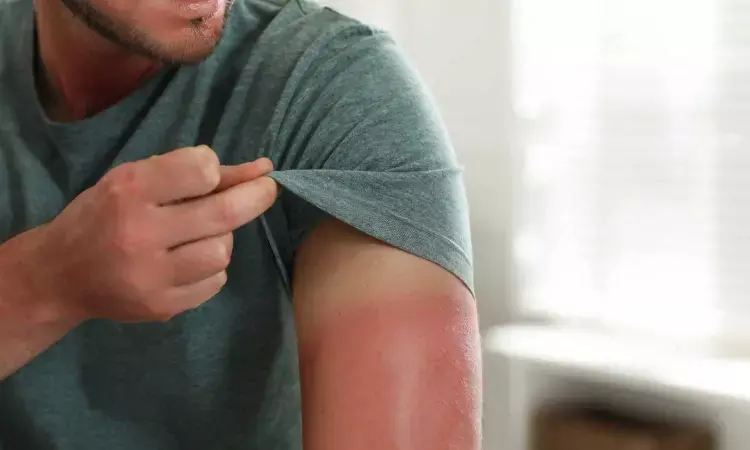- Home
- Medical news & Guidelines
- Anesthesiology
- Cardiology and CTVS
- Critical Care
- Dentistry
- Dermatology
- Diabetes and Endocrinology
- ENT
- Gastroenterology
- Medicine
- Nephrology
- Neurology
- Obstretics-Gynaecology
- Oncology
- Ophthalmology
- Orthopaedics
- Pediatrics-Neonatology
- Psychiatry
- Pulmonology
- Radiology
- Surgery
- Urology
- Laboratory Medicine
- Diet
- Nursing
- Paramedical
- Physiotherapy
- Health news
- Fact Check
- Bone Health Fact Check
- Brain Health Fact Check
- Cancer Related Fact Check
- Child Care Fact Check
- Dental and oral health fact check
- Diabetes and metabolic health fact check
- Diet and Nutrition Fact Check
- Eye and ENT Care Fact Check
- Fitness fact check
- Gut health fact check
- Heart health fact check
- Kidney health fact check
- Medical education fact check
- Men's health fact check
- Respiratory fact check
- Skin and hair care fact check
- Vaccine and Immunization fact check
- Women's health fact check
- AYUSH
- State News
- Andaman and Nicobar Islands
- Andhra Pradesh
- Arunachal Pradesh
- Assam
- Bihar
- Chandigarh
- Chattisgarh
- Dadra and Nagar Haveli
- Daman and Diu
- Delhi
- Goa
- Gujarat
- Haryana
- Himachal Pradesh
- Jammu & Kashmir
- Jharkhand
- Karnataka
- Kerala
- Ladakh
- Lakshadweep
- Madhya Pradesh
- Maharashtra
- Manipur
- Meghalaya
- Mizoram
- Nagaland
- Odisha
- Puducherry
- Punjab
- Rajasthan
- Sikkim
- Tamil Nadu
- Telangana
- Tripura
- Uttar Pradesh
- Uttrakhand
- West Bengal
- Medical Education
- Industry
Consumption of grapes protects skin against UV damage: Study

USA: Grapes consumption protects against ultraviolet (UV) damage to the skin, according to findings from a recent human study published in the scientific journal Antioxidants.
The study showed that after consuming two ¼ cups of grapes every day for two weeks, the subjects showed increased sunburn resistance. Also, subjects displaying UV resistance exhibited microbiome and metabolomic profiles indicating a correlation between the gut and skin. Polyphenols (natural components found in grapes) are thought to be responsible for these beneficial effects.
This new study reinforces previous research in this area. In this investigation with 29 human volunteers, researchers examined the impact of consuming whole grape powder equivalent to 2 ¼ cups of grapes per day for 14 days against photodamage from UV light. Subjects' skin response to UV light was measured before and after consuming grapes for two weeks by determining the threshold dose of UV radiation that induced visible reddening after 24 hours-the Minimal Erythema Dose (MED). Additionally, metabolomic analysis of the gut microbiome, blood, and urinary samples was undertaken.
Ultimately, one-third of the subjects demonstrated UV resistance following grape consumption, and these same subjects displayed significant differences in the microbiome and metabolome compared with the non-responders. Notably, the same three urinary metabolites were depressed in the UV-resistant group. One metabolite in particular (2'-deoxyribose) is a strong indicator of reduced photodamage and suggests unique genetic profiles relevant to personalized medicine.
Furthermore, three of the UV-resistant subjects showed a durable response where UV protection remained after reverting back to no grape consumption for four more weeks. This work suggests that a segment of the population can resist sunburn following grape consumption and that there is a correlation between the gut-skin axis and UV resistance.
Over 3 million Americans are affected by skin cancer each year, largely as a result of exposure to sunlight. It is estimated that one in five Americans will develop skin cancer by the age of 70.[2] Most skin cancer cases are associated with exposure to UV radiation from the sun: about 90 percent of nonmelanoma skin cancers and 86 percent of melanomas, respectively. Additionally, an estimated 90 percent of skin ageing is caused by the sun.
John Pezzuto-lead author of the paper and professor and dean at Western New England University in Springfield, MA – notes,"'Let thy food be thy medicine and medicine be thy food' dates back to the time of Hippocrates. Now, after 2500 years, as exemplified by this human study conducted with dietary grapes, we are still learning the reality of this statement."
Reference:
Pezzuto, John M., Asim Dave, Eun-Jung Park, Diren Beyoğlu, and Jeffrey R. Idle. 2022. "Short-Term Grape Consumption Diminishes UV-Induced Skin Erythema" Antioxidants 11, no. 12: 2372. https://doi.org/10.3390/antiox11122372
Dr Kamal Kant Kohli-MBBS, DTCD- a chest specialist with more than 30 years of practice and a flair for writing clinical articles, Dr Kamal Kant Kohli joined Medical Dialogues as a Chief Editor of Medical News. Besides writing articles, as an editor, he proofreads and verifies all the medical content published on Medical Dialogues including those coming from journals, studies,medical conferences,guidelines etc. Email: drkohli@medicaldialogues.in. Contact no. 011-43720751


